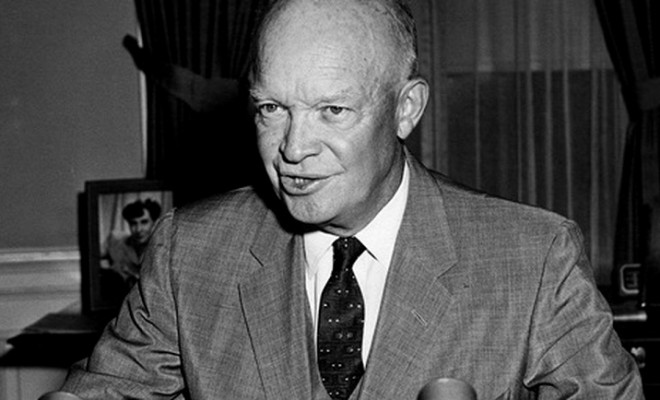
Dwight Eisenhower: Lessons from the ‘balancer in chief’
William I. Hitchcock, author of The Age of Eisenhower, explains how Dwight D. Eisenhower inspired his country and led Americans through times of uncertainty and radical change.
Seventy-five years ago, the supreme allied commander of the Allied Expeditionary Force dictated a message simple and sublime: “The mission of this Allied force was fulfilled at 0241, local time, May 7, 1945. Eisenhower.” It was the end of World War II in Europe, a victory then as now venerated by millions. It also marked an amazing achievement for Eisenhower himself. When German and Soviet tanks rumbled across Poland to start the war in September 1939, Ike had been a mere lieutenant colonel (and a major, stuck in rank for 12 consecutive years before that). When Japan bombed Pearl Harbor, on December 7, 1941, bringing the United States into the conflagration, he had been promoted to a one-star brigadier general only a few short months before. Yet Eisenhower concluded the war as a five-star general, the architect of Operation Overlord—the allied invasion of Normandy—and the indispensable man who had balanced the interests and egos of a galaxy of generals and political leaders.
Balance and mission would distinguish Eisenhower’s presidency in the 1950s. For Eisenhower, it was the “Great Equation.” How could the United States afford to project military power against expansionist, totalitarian regimes abroad, while at the same time foster economic prosperity at home and do so for decades, if needed, without going bust? It’s a choice commonly referred to as “guns or butter.” 1 But for Eisenhower, it was both guns and butter, today and tomorrow, and more—a shared sense of national purpose. When the newly elected Eisenhower took office in early 1953, America was embroiled in the Korean War, Western Europe seemed to lay open before the USSR, and the Great Depression still weighed heavy in Americans’ recent memories. Eight years later, when Eisenhower gave his farewell address, America had extracted itself from the Asian land war, avoided a European war, and was deep into what’s remembered as a halcyon era of good jobs, comfortable suburbia, and “Happy Days.” The ’50s have come down to us as a golden age.
Συνέχεια ανάγνωσης εδώ




